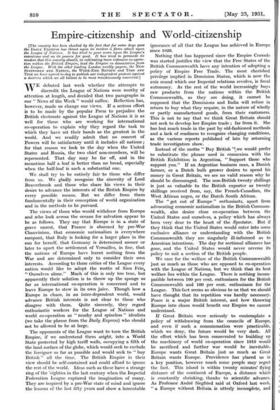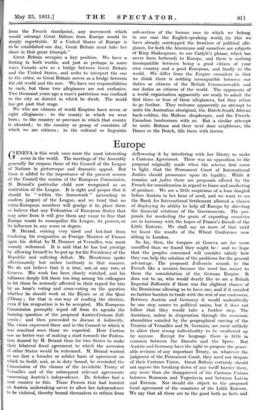Empire-citizenship and World-citizenship
[The country has been shocked by the fact that for some days past the DAILY EximEss has thrust upon its readers a fierce attack upon the League of Nations. It has tried to pour scorn upon the League's intentions and on its powers for good. It has tried to persuade its readers that this country should, in cultivating more intensive co-opera- tion within the British Empire, lead the Empire in dissociation from the League. With the other leading London weekly papers, the NEw STATESMAN AND NATION, the WEEK-END REVIEW and TIME AND TIDE we have agreed to-day to publish our independent protests against a doctrine which we all believe to be most mischievously conceived.] WE debated last week whether the attempts to discredit the League of Nations were worthy of attention at length, and decided that two paragraphs in our " News of the Week " would suffice. Reflection has, however, made us change our views. If a serious effort is to be made by the popular Press to prejudice the British electorate against the League of Nations it is as well for those who are working for international co-operation to explain why they regard the task to which they have set their hands as the greatest in the world. And we readily admit that no concert of Powers will be satisfactory until it includes all nations ; for that reason we look to the day when the United States and Russia, the two chief non-members, will be represented. That day may be far off, and in the meantime half a loaf is better than no bread, especially when the half-loaf is such a substantial one.
We shall try to be entirely fair to those who differ from us. We gladly recognize the sincerity of Lord Beaverbrook and those who share his views in their desire to advance the interests of the British Empire by every possible means. But we differ from them fundamentally in their conception of world organization and in the methods to be pursued.
The views of those who would withdraw from Europe and who look across the oceans for salvation appear to be as follows. They say that Europe is in a state of grave unrest, that France is obsessed by pre-War Chauvinism, that economic nationalism is everywhere rampant, that Italy is looking for a larger place in the sun for herself, that Germany is determined sooner or later to upset the settlement of Versailles, in fine, that the nations of Europe have learnt nothing from the War and are determined only to consider their own interests. According to these critics of the League every nation would like to adopt the motto of Sinn Fein, " Ourselves alone." Much of this is only too true, but apparently their solution is to throw up the sponge so far as international co-operation is concerned and to leave Europe to stew in its own juice. Though how a Europe in chaos, in an inter-dependent world, would advance British interests is not clear to those who disagree with them. Quite sincerely, they regard enthusiastic workers for the League of Nations and world co-operation as " mushy and spineless " idealists (we take the phrase from the Daily Express) who should not be allowed to be at large.
The opponents of the League want to turn the British Empire, if we understand them aright, into a World State protected by high tariff walls, occupying a fifth of the land surface of the globe, which would seek to exclude the foreigner so far as possible and would seek to " buy British " all the time. The British Empire in their view should be self-contained and could afford to ignore the rest of the world. Ideas such as these have a strange ring of the 'eighties in the last century when the Imperial Federation League captured the imagination of many. They are inspired by a pre-War state of mind and ignore the lessons of the last fifty years and show a lamentable ignorance of all that the League has achieved in Europe since 1920.
Nothing that has happened since the Empire Crusade was started justifies the view that the Free States of the British Commonwealth have any intention of adopting a policy of Empire Free Trade. The most cherished privilege implied in Dominion Status, which is now the axis round which our Imperial relations revolve, is fiscal autonomy. As the rest of the world increasingly buys raw products from the nations within the British Commonwealth, as they are doing, it cannot be supposed that the Dominions and India will refuse in return to buy what they require, in the nature of wholly or partly manufactured goods, from their customers. This is not to say that we think Great Britain should not seek to develop her Empire trade ; far from it. She has lost much trade in the past by old-fashioned methods and a lack of readiness to recognize changing conditions, as the various reports published of late by returning trade investigators show. • Instead of the motto " Buy British "1 we would prefer to substitute the phrase used in connexion with the British Exhibition in Argentina, " Support those who support you." If an Argentine business man, a Danish farmer, or a Dutch bulb grower desires to spend his money in Great Britain, we see no valid reason why he should be discouraged. The non-British twenty shillings is just as valuable to the British exporter as twenty shillings received from, say, the French-Canadian, the West African negro, or the Dutch South African.
The " get out of Europe " enthusiasts, apart from advocating economic nationalism in the British Common- wealth, also desire close co-operation between the United States and ourselves, a policy which has always been very dear to the heart of the Spectator. But if they think that the United States would enter into some exclusive affiance or understanding with the British Commonwealth they are singularly ill-informed as to American intentions. The day for sectional alliances has gone, and the United States would never reverse its policy to suit a section of the British people.
We care for the welfare of the British Commonwealth just as much as those who are opposed to co-operation with the League of Nations, but we think that its best welfare lies within the League. There is nothing incom- patible between 100 per cent. enthusiasm for the British Commonwealth and 100 per cent. enthusiasm for the League. This fact seems so obvious to us that we should have thought that its repetition was hardly necessary. Peace is a major British interest, and how throwing Europe into chaos would benefit our Empire we cannot understand.
If Great Britain were seriously to contemplate a policy of withdrawing from the councils of Europe, and even if such a consummation were practicable, which we deny, the future would be very dark. All the effort which has been consecrated to building up the machinery of world co-operation since 1919 would be sacrificed and further war would be inevitable. Europe wants Great Britain just as much as Great Britain wants Europe. Providence has placed us in a key position, however much some people may regret the fact. This island is within twenty minutes' flying distance of the continent of Europe, a distance which is constantly shrinking, thanks to scientific advance. As Professor Andre Siegfried said at Oxford last week, " a Europe without Britain is utterly incomplete, and from the French standpoint, any movement which would estrange Great Blitain. from Europe would be deeply regrettable. If a United States of Europe is to be established one day, Great Britain must take her share in that great triumph."
Great Britain occupies a key position. We have a footing in both worlds, and just as perhaps in some ways Canada acts as a bridge between Great Britain and the United States, and seeks to interpret the one to the other, so Great Britain serves as a bridge between the old world and the new. We have our responsibilities to each, but these two allegiances arc not exclusive. Two thousand years ago a man's patriotism was confined to the city or district in which he dwelt. The world has got past that stage.
We who are citizens of world Empires have seven or eight allegiances : to the county in which we were born ; to the country or province in which that county is situated ; to the country or group of countries of which we are citizens ; to the cultural or linguistic sub-section of the human race to which we belong, in our case the English-speaking world, (in this we have already outstepped the frontiers of political alle- giance, for both the Americans and ourselves are subjects of King Shakespeare, to use Carlyle's phrase, which has never been bettered) to Europe, and there is nothing incompatible between being a good citizen of your own country and a good European, and finally to the world. We differ from the Empire crusaders in that we think there is nothing incompatible between our duties as citizens of the British Commonwealth and our duties as citizens of the world. The opponents of a world organization apparently are ready to admit the first three or four of these allegiances, but they refuse to go further. They welcome apparently an attempt to unite the Australian aboriginal, the Dutch-South African back-veldter, the Maltese shopkeeper, and the French- Canadian lumberman with us. But a similar attempt to unite Britons and their next door neighbours, the Danes or the Dutch, fills them with horror.







































 Previous page
Previous page